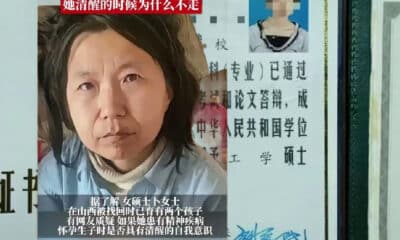China Media
Finally Some Answers? Follow-Up to the 6.10 Tangshan BBQ Restaurant Incident
The Tangshan incident sparked national outrage, and its aftermath lasted for weeks. Now, some unanswered questions are finally answered.
Published
2 years agoon
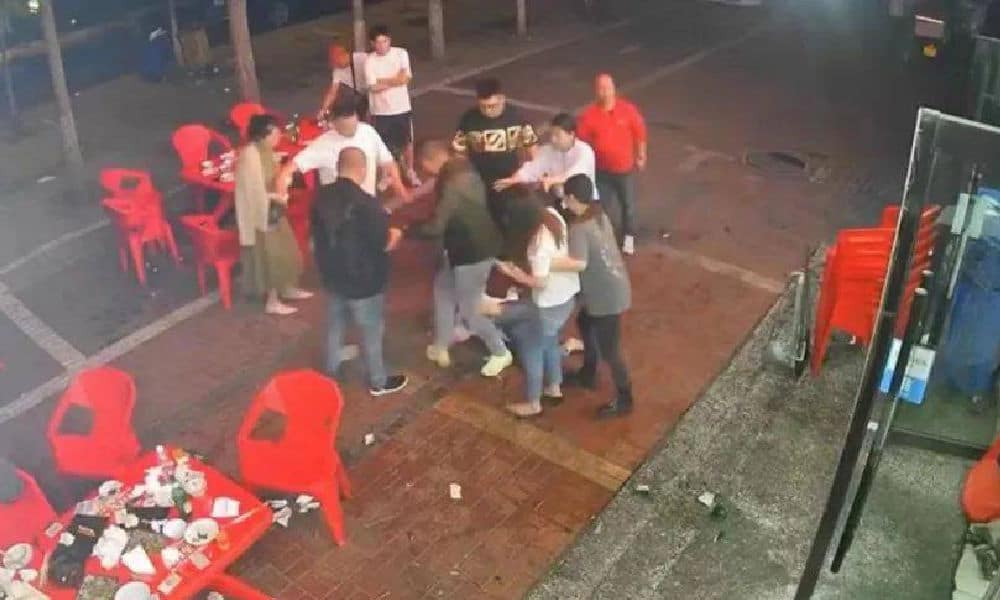
Over two months after a shockingly violent attack on female customers at a Tangshan restaurant dominated Chinese social media and raised concerns over violence against women and gang crimes, CCTV has published a final report about the incident. On Monday, 28 people have been prosecuted for their involvement in the incident.
Click here for an overview of our articles on the Tangshan restaurant incident.
In June of 2022, an outburst of violence against female customers at a restaurant in Tangshan sent shockwaves across Chinese social media. Surveillance videos from the restaurant showed how at least four women were brutally attacked by a group of men.
The incident, now known as the ‘6.10 Tangshan Beating Incident’ (6·10唐山打人案件) sparked national outrage and its aftermath lasted for many weeks, with people demanding more answers on what exactly happened, how authorities dealt with it, and if the female victims were now safe.
Two months later, another shocking incident became a trending topic on Chinese social media: gruesome videos surfacing online showed how a Tangshan man driving a white SUV drove over a woman twice in a local parking lot. The female victim died after resuscitation efforts at a local hospital.
The incident brought back memories of the other Tangshan outburst of violence, and the online demand for lingering questions to be answered grew stronger again. At one point, one hashtag demanding a follow-up into the matter was (temporarily) taken offline, triggering more criticism on how the issue was handled and possibly silenced by authorities.
But on August 29, some lingering questions were finally answered when state broadcaster CCTV published a news report giving the “whole story” of what happened that night (hashtag #央视梳理唐山打人案始末#).
The 6.10 Tangshan BBQ Restaurant Incident
In the early morning of June 10th of 2022, just passed 2.30 am, the Laohancheng barbecue restaurant (老汉城烧烤店) in Tangshan’s Lubei District had multiple tables occupied by late-night diners. At one of the corner tables, a group of three female customers were dining and chatting. A couple of men were standing at another table.
Security cameras inside the restaurant captured how at 2.40 am, the atmosphere changed when the three women were approached by a man in a green jacket, who then proceeded to touch the back of one of the women dressed in a white t-shirt.
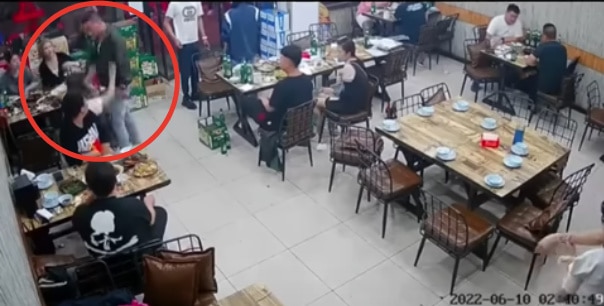
When the woman pushed his arm away, the man tried to grab her, and she quickly slapped his hand. The scene then altercated within seconds. The man hit the woman in the face, after which one of her friends quickly tried to come to her rescue and hit the man with a beer bottle. Her friend was then attacked by at least three men, while the woman in white gets hit by the men in the green jacket.
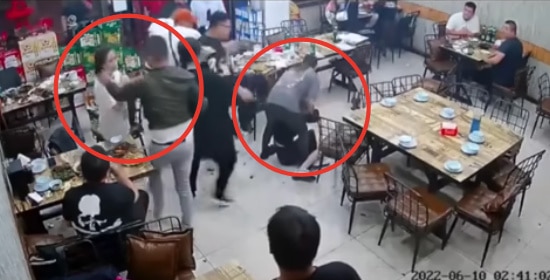
It just took seconds for the woman in white to be dragged out of the restaurant by her hair while some other diners, still seated at their table, watch the scene unfold.
Outside, security cameras captured how a group of men seated at an outdoor table joined the attack, kicking the woman while she was lying helplessly on the pavement, violently pushing away another woman who tried to stop them from doing so. A fourth woman also got slapped.
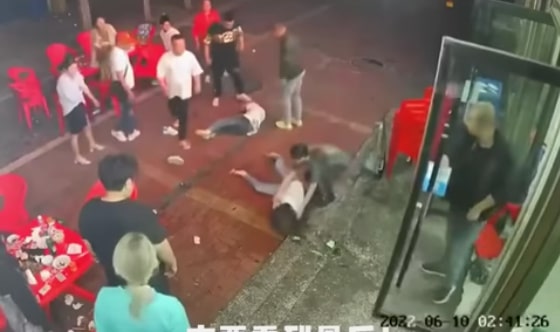
While the two women lie motionless on the pavement, the men stand around.
In the minutes that followed, security cameras captured how the scene got more chaotic, with at least five men standing around the woman in white kicking her and smashing a bottle on her head.
After the outburst of violence, the men seemingly fled the scene, leaving the injured woman lying on the street.
But security footage that was recorded from another angle, released days after the incident, shows that after the woman was left on the street, the incident continued. One of the women could be seen running into a back alley next to the restaurant, with others following. The woman in white also stood up from the ground and ran away in the same direction.
Until the CCTV report, it remained unclear what had happened as there apparently were no security cameras in the back alley.
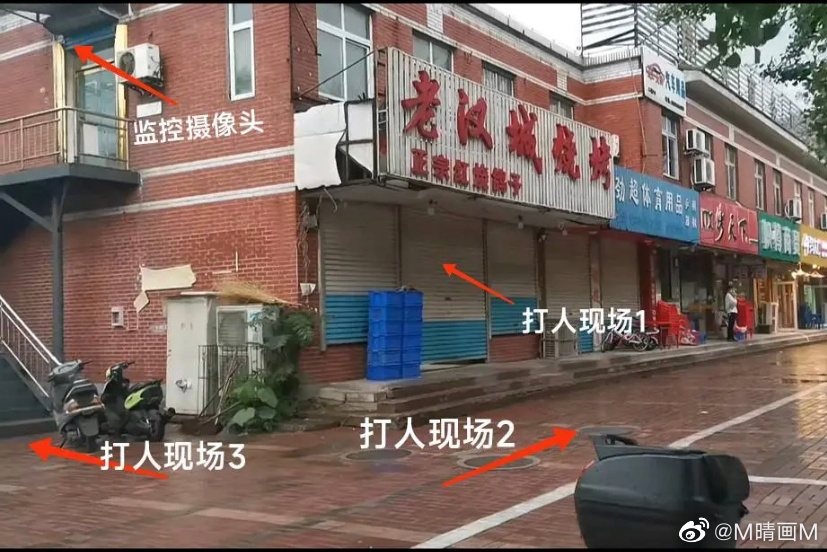
Image showing the back alley where the incident continued.
All that was known according to previous official media reports, was that two female victims had been sent to the hospital for treatment and were in stable condition. Two other women reportedly suffered minor injuries and were not hospitalized.
After news was released that nine suspects involved in the beating had been arrested, no further statements nor updates were given.
The silence surrounding the female victims attracted a lot of attention on Chinese social media. Many Weibo users suggested that news about the victims was purposely withheld and that people were being silenced about how the women were actually doing.
The Tangshan incident also led to more online discussions about gang-related crimes. The fact that at least five of the suspects had criminal records was a cause of anger among those who felt that they should not have been allowed to be out and about at all and that they were covered by authorities.
One former victim of a man involved in the attack also spoke out. He said he recognized one of the main suspects, Chen Jizhi (陈继志), from the security footage, claiming he was locked inside the trunk of a car for ten hours by Chen a few years prior. A hashtag related to the story received over 300 million views on June 17th (#男子称曾被陈继志等殴打险被活埋#).
“The Whole Story” by CCTV
In its news report of August 29, state broadcaster CCTV reflects on what happened during that terrible night in June and for the very first time since the incident, one of the victims (the ‘woman in white’) speaks out, using the pseudonym of ‘Wang X.’
Wang X. clarifies that the story indeed unfolded as security cameras captured it. She did not know the man who came up to their table, and when he touched her, she made clear she did not want him to, and then the attack began.
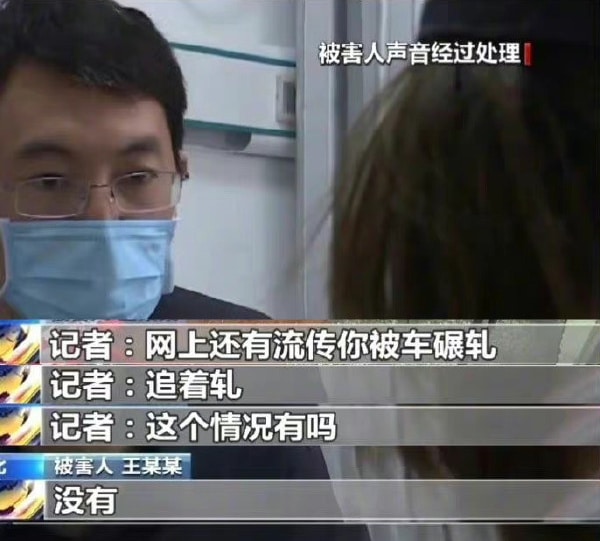
The report clarifies that after the violent beating that occurred in front of the restaurant, the attack further continued in the alley behind the restaurant for approximately 1,5 minutes.
Wang X. says that in the alley, she was beaten again by multiple men. Before the men ran away, they threatened to kill her if she would call the police. She then fled. Online rumors about the victims being sexually assaulted by the men were denied, along with other claims that they were run over by a car.
CCTV reports that an investigation by public security officers found that Chen Jizhi and seven others have been involved in gang-related crimes since at least 2012. For years, they were involved in gang fights, illegal gambling, extortion, robberies, assault, and other criminal activities.
In one incident that occurred in 2015, Chen was involved in a conflict about a car loan with an individual by the name of Shang. Chen sent some of his guys over to Shang’s residence, where they used chain locks to beat him and later locked him inside the trunk of their car.
A total of 28 people, including Chen Jizhi, were prosecuted on Monday for their involvement in the Tangshan beating.
As Hebei authorities investigated the issue, they found that some local officers protected the gangs and basically allowed them to commit more crimes by not strictly enforcing laws. At least fifteen local officials have been investigated, and eight of them were taken into custody on suspicion of abusing power, taking bribes, and forming a ‘shield’ for gang-related violence.
Online Responses
On Chinese social media, there have been different responses to the latest outcomes of the Tangshan incident. On one side, there are those applauding authorities for investigating the case and dealing with it in the appropriate way.
“It’s very good that this matter has finally come to a conclusion after two months,” some commenters write, with others saying it is a good thing that justice was served – both for the gang members as well as the officials who covered for them (serving as ‘protective umbrella’ ‘保护伞’).
On the other side, there are also people who still think there is more to the story and that the entire system is corrupt. Some people still argue that the back alley where the incident continued must have also had security cameras, but that the footage has been intentionally hidden.
One Shandong-based Weibo user wrote:
“When I see this kind of news I sometimes see in the comment sections that there are those comments saying ‘the government is already rotten to the core’ and then those who refute that, saying that it’s ‘just a few officials who have a problem.’ First a few officials in Shanghai had a problem, then a few in Tangshan, now it’s a few officials in Henan, tomorrow it’ll be some local officials in Shanxi… I’m sorry, but the more ‘individuals’ are rotten, the more the entire organization is rotten.”
“I’m looking forward to the trial,” another Weibo user writes: “I hope they’ll be punished severely.”
As for the restaurant where it all happened: it is no longer there and has moved out since late June of this year during the aftermath of the incident.
Another commenter wrote: “I just hope the girls involved will make a full recovery, both physically as well as mentally.” One other person agreed, writing: “We now got some answers, and I hope people can calm down. Most of all, I hope that the women will slowly but surely heal from this experience.”
By Manya Koetse
Get the story behind the hashtag. Subscribe to What’s on Weibo here to receive our weekly newsletter and get access to our latest articles:
Spotted a mistake or want to add something? Please let us know in comments below or email us. First-time commenters, please be patient – we will have to manually approve your comment before it appears.
©2022 Whatsonweibo. All rights reserved. Do not reproduce our content without permission – you can contact us at info@whatsonweibo.com.
Manya is the founder and editor-in-chief of What's on Weibo, offering independent analysis of social trends, online media, and digital culture in China for over a decade. Subscribe to gain access to content, including the Weibo Watch newsletter, which provides deeper insights into the China trends that matter. More about Manya at manyakoetse.com or follow on X.

Also Read
China Media
12-Year-Old Girl from Shandong Gets Infected with HPV: Viral Case Exposes Failures in Protecting Minors
A doctor in Tai’an faced resistance when she tried to report a 12-year-old girl’s HPV case. She then turned to social media instead.
Published
2 days agoon
December 18, 2024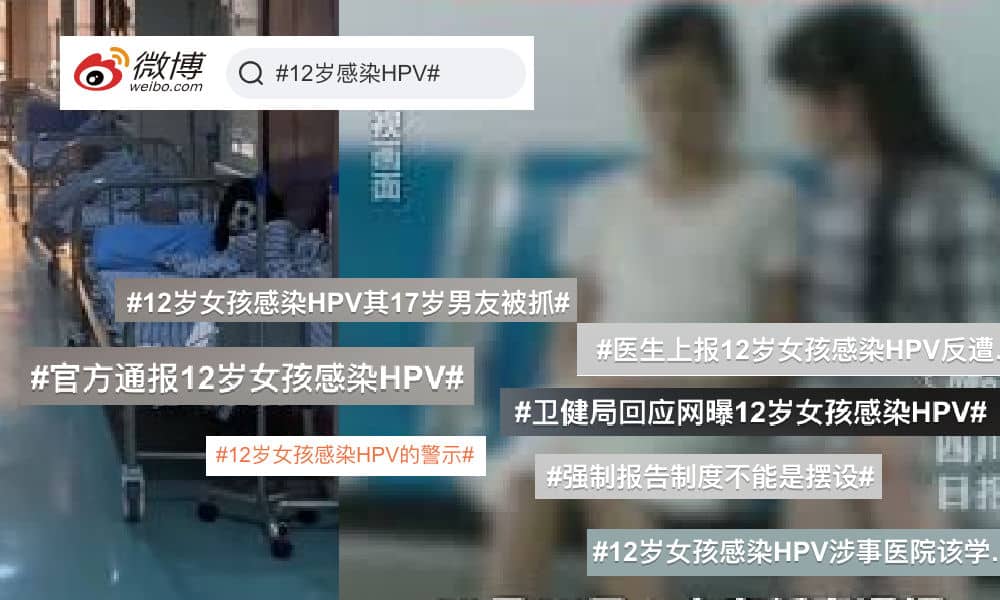
A 12-year-old girl from Shandong was diagnosed with HPV at a local hospital. When a doctor attempted to report the case, she faced resistance. Weibo users are now criticizing how the incident was handled.
Over the past week, there has been significant uproar on Chinese social media regarding how authorities, official channels, and state media in China have handled cases of sexual abuse and rape involving female victims and male perpetrators, often portraying the perpetrators in a way that appears to diminish their culpability.
One earlier case, which we covered here, involved a mentally ill female MA graduate from Shanxi who had been missing for over 13 years. She was eventually found living in the home of a man who had been sexually exploiting her, resulting in at least two children. The initial police report described the situation as the woman being “taken in” or “sheltered” by the man, a phrasing that outraged many netizens for seemingly portraying the man as benevolent, despite his actions potentially constituting rape.
Adding to the outrage, it was later revealed that local authorities and villagers had been aware of the situation for years but failed to intervene or help the woman escape her circumstances.
Currently, another case trending online involves a 12-year-old girl from Tai’an, Shandong, who was admitted to the hospital in Xintai on December 12 after testing positive for HPV.
HPV stands for Human Papillomavirus, a common sexually transmitted infection that can infect both men and women. Over 80% of women experience HPV infection at least once in their lifetime. While most HPV infections clear naturally within two years, some high-risk HPV types can cause serious illness including cancer.
“How can you be sure she was sexually assaulted?”
The 12-year-old girl in question had initially sought treatment for pelvic inflammatory disease, but upon review, her doctor discovered that she had been previously treated for vaginitis six months earlier. During further discussions with the girl, the doctor learned she had been sexually active with a boy five years her senior and was no longer attending school.
Given that the age of consent in China is 14 years old, the doctor sought to report the case to authorities. However, this effort was reportedly met with resistance from the hospital’s medical department, where she was allegedly questioned: “How can you be sure she was sexually assaulted?”
When attempts to escalate the case to the women’s federation and health commission went unanswered, the doctor turned to a blogger she knew (@反射弧超长星人影九) for help in raising awareness.
The blogger shared the story on Weibo but failed to receive a response through private messages from the Tai’an Police. They then contacted a police-affiliated Weibo channel they were familiar with, which eventually succeeded in alerting the Shandong police, prompting the formation of an investigation team.
As a result, on December 16, the 17-year-old boy was arrested and is now facing legal criminal measures.
According to Morning News (@新闻晨报), the boy in question is the 17-year-old Li (李某某), who had been in contact with the girl through the internet since May of 2024 after which they reportedly “developed a romantic relationship” and had “sexual relations.”
Meanwhile, fearing for her job, the doctor reportedly convinced the blogger to delete or privatize the posts. The blogger was also contacted by the hospital, which had somehow obtained the blogger’s phone number, asking for the post to be taken down. Despite this, the case had already gone viral.
The blogger, meanwhile, expressed frustration after the case gained widespread media traction, accusing others of sharing it simply to generate traffic. They argued that once the police had intervened, their goal had been achieved.
But the case goes beyond this specific story alone, and sparked broader criticisms on Chinese social media. Netizens have pointed out systemic failures that did not protect the girl, including the child’s parents, her school, and the hospital’s medical department, all of whom appeared to have ignored or silenced the issue. As WeChat blogging account Xinwenge wrote: “They all tacitly colluded.”
Xinwenge also referenced another case from 2020 involving a minor in Dongguang, Liaoning, who was raped and subsequently underwent an abortion. After the girl’s mother reported the incident to the police, the procuratorate discovered that a hospital outpatient department had performed the abortion but failed to report it as required by law. The procuratorate notified the health bureau, which fined the hospital 20,000 yuan ($2745) and revoked the department’s license.
Didn’t the hospital in Tai’an also violate mandatory reporting requirements? Additionally, why did the school allow a 12-year-old girl to drop out of the compulsory education programme?
“This is not a “boyfriend” or a “romantic relationship.””
The media reporting surrounding this case also triggered anger, as it failed to accurately phrase the incident as involving a raped minor, instead describing it as a girl having ‘sexual relations’ with a much older ‘boyfriend.’
Under Chinese law, engaging in sexual activity with someone under 14, regardless of their perceived willingness, is considered statutory rape. A 12-year-old is legally unable to give consent to sexual activity.
“The [Weibo] hashtag should not be “12-Year-Old Infected with HPV, 17-Year-Old Boyfriend Arrested” (#12岁女孩感染HPV其17岁男友被抓#); it should instead be “17-Year-Old Boy Sexually Assaulted 12-Year-Old, Causing Her to Become Infected” (#17岁男孩性侵12岁女孩致其感染#).”
Another blogger wrote: “First, we had the MA graduate from Shanxi who was forced into marriage and having kids, and it was called “being sheltered.” Now, we have a little girl from Shandong being raped and contracting HPV, and it was called “having a boyfriend.” A twelve-year-old is just a child, a sixth-grader in elementary school, who had been sexually active for over six months. This is not a “boyfriend” or a “romantic relationship.” The proper way to say it is that a 17-year-old male lured and raped a 12-year-old girl, infecting her with HPV.”
By now, the case has garnered widespread attention. The hashtag “12-Year-Old Infected with HPV, 17-Year-Old Boyfriend Arrested” (#12岁女孩感染HPV其17岁男友被抓#) has been viewed over 160 million times on Weibo, while the hashtag “Official Notification on 12-Year-Old Infected with HPV” (#官方通报12岁女孩感染hpv#) has received over 90 million clicks.
Besides the outrage over the individuals and institutions that tried to suppress the story, this incident has also sparked a broader discussion about the lack of adequate and timely sexual education for minors in Chinese schools. Liu Wenli (刘文利), an expert in children’s sexual education, argued on Weibo that both parents and schools play critical roles in teaching children about sex, their bodies, personal boundaries, and the risks of engaging with strangers online.
“Protecting children goes beyond shielding them from HPV infection,” Liu writes. “It means safeguarding them from all forms of harm. Sexual education is an essential part of this process, ensuring every child’s healthy and safe development.”
Many netizens discussing this case have expressed hope that the female doctor who brought the issue to light will not face repercussions or lose her job. They have praised her for exposing the incident and pursuing justice for the girl, alongside the efforts of those on Weibo who helped amplify the story.
The blogger who played a key role in exposing the story recently wrote: “I sure hope the authorities will give an award to the female doctor for reported this case in accordance with the law.” For some, the doctor is nothing short of a hero: “This doctor truly is my role model.”
By Manya Koetse, with contributions by Miranda Barnes
(follow on X, LinkedIn, or Instagram)
Spotted a mistake or want to add something? Please let us know in comments below or email us. First-time commenters, please be patient – we will have to manually approve your comment before it appears.
©2024 Whatsonweibo. All rights reserved. Do not reproduce our content without permission – you can contact us at info@whatsonweibo.com.
China Media
Hu Xijin’s Comeback to Weibo
After 90 days of silence, Hu Xijin is back on Weibo—but not everyone’s thrilled.
Published
1 month agoon
November 7, 2024
A SHORTER VERSION OF THIS ARTICLE WAS PART OF THE MOST RECENT WEIBO WATCH NEWSLETTER.
For nearly 100 days, since July 27, the well-known social and political commentator Hu Xijin (胡锡进) remained silent on Chinese social media. This was highly unusual for the columnist and former Global Times editor-in-chief, who typically posts multiple Weibo updates daily, along with regular updates on his X account and video commentaries. His Weibo account boasts over 24.8 million followers.
Various foreign media outlets speculated that his silence might be related to comments he previously made about the Third Plenum and Chinese economics, especially regarding China’s shift to treating public and private enterprises equally. But without any official statement, Chinese netizens were left to speculate about his whereabouts.
Most assumed he had, in some way, taken a “wrong” stance in his commentary on the economy and stock market, or perhaps on politically sensitive topics like the Suzhou stabbing of a Japanese student, which might have led to his being sidelined for a while. He certainly wouldn’t be the first prominent influencer or celebrity to disappear from social media and public view—when Alibaba’s Jack Ma seemed to have fallen out of favor with authorities, he went missing, sparking public concern.
After 90 days of absence, the most-searched phrases on Weibo tied to Hu Xijin’s name included:
胡锡进解封 “Hu Xijin ban lifted”
胡锡进微博解禁 “Hu Xijin’s Weibo account unblocked”
胡锡进禁言 “Hu Xijin silenced”
胡锡进跳楼 “Hu Xijin jumped off a building”

On October 31, Hu suddenly reappeared on Weibo with a post praising the newly opened Chaobai River Bridge, which connects Beijing to Dachang in Hebei—where Hu owns a home—significantly reducing travel time and making the more affordable Dachang area attractive to people from Beijing. The post received over 9,000 comments and 25,000 likes, with many welcoming back the old journalist. “You’re back!” and “Old Hu, I didn’t see you on Weibo for so long. Although I regularly curse your posts, I missed you,” were among the replies.
When Hu wrote about Trump’s win, the top comment read: “Old Trump is back, just like you!”
Not everyone, however, is thrilled to see Hu’s return. Blogger Bad Potato (@一个坏土豆) criticized Hu, claiming that with his frequent posts and shifting views, he likes to jump on trends and gauge public opinion—but is actually not very skilled at it, allegedly contributing to a toxic online environment.
Other bloggers have also taken issue with Hu’s tendency to contradict himself or backtrack on stances he takes in his posts.
Some have noted that while Hu has returned, his posts seem to lack “soul.” For instance, his recent two posts about Trump’s win were just one sentence each. Perhaps, now that his return is fresh, Hu is carefully treading the line on what to comment on—or not.
Nevertheless, a post he made on November 3rd sparked plenty of discussion. In it, Hu addressed the story of math ‘genius’ Jiang Ping (姜萍), the 17-year-old vocational school student who made it to the top 12 of the Alibaba Global Mathematics Competition earlier this year. As covered in our recent newsletter, the final results revealed that both Jiang and her teacher were disqualified for violating rules about collaborating with others.
In his post, Hu criticized the “Jiang Ping fever” (姜萍热) that had flooded social media following her initial qualification, as well as Jiang’s teacher Wang Runqiu (王润秋), who allegedly misled the underage Jiang into breaking the rules.
The post was somewhat controversial because Hu himself had previously stated that those who doubted Jiang’s sudden rise as a math talent and presumed her guilty of cheating were coming from a place of “darkness.” That post, from June 23 of this year, has since been deleted.
Despite the criticism, some appreciate Hu’s consistency in being inconsistent: “Hu Xijin remains the same Hu Xijin, always shifting with the tide.”

Hu has not directly addressed his absence from Weibo. Instead, he shared a photo of himself from 1978, when he joined the military. In that post, he reflected on his journey of growth, learning, and commitment to the country. Judging by his renewed frequency of posting, it seems he’s also recommitted to Weibo.
By Manya Koetse
(follow on X, LinkedIn, or Instagram)
Spotted a mistake or want to add something? Please let us know in comments below or email us. First-time commenters, please be patient – we will have to manually approve your comment before it appears.
©2024 Whatsonweibo. All rights reserved. Do not reproduce our content without permission – you can contact us at info@whatsonweibo.com.
Subscribe

12-Year-Old Girl from Shandong Gets Infected with HPV: Viral Case Exposes Failures in Protecting Minors

Explaining the Bu Xiaohua Case: How One Woman’s Disappearance Captured Nationwide Attention in China

Story of Chinese Female MA Graduate Going Missing for 13 Years Sparks Online Storm

Weibo Watch: China’s Online Feminism Is Everywhere

Why Chinese Hit Movie “Her Story” is ‘Good Stuff’: Stirring Controversy and Celebrating Female Perspectives

Death of Chinese Female Motorcycle Influencer ‘Shigao ProMax’ Sparks Debate on Risky Rides for Online Attention

Hidden Hotel Cameras in Shijiazhuang: Controversy and Growing Distrust

Weibo Watch: Small Earthquakes in Wuhan

The Price of Writing Smut: Inside China’s Crackdown on Erotic Fiction

Why the “人人人人景点人人人人” Hashtag is Trending Again on Chinese Social Media

The Hashtagification of Chinese Propaganda

Controversial Wanghong Livestreamers Are Becoming a Weibo Staple in China

Weibo Watch: “Comrade Trump Returns to the Palace”

The ‘Cycling to Kaifeng’ Trend: How It Started, How It’s Going

Hu Xijin’s Comeback to Weibo
Get in touch
Would you like to become a contributor, or do you have any tips or suggestions? Get in touch here!
Popular Reads
-

 China Insight7 months ago
China Insight7 months agoThe Tragic Story of “Fat Cat”: How a Chinese Gamer’s Suicide Went Viral
-

 China Music9 months ago
China Music9 months agoThe Chinese Viral TikTok Song Explained (No, It’s Not About Samsung)
-

 China Insight10 months ago
China Insight10 months agoThe ‘Two Sessions’ Suggestions: Six Proposals Raising Online Discussions
-

 China Digital7 months ago
China Digital7 months agoChina’s 2024 Gaokao Triggers Online Discussions on AI



